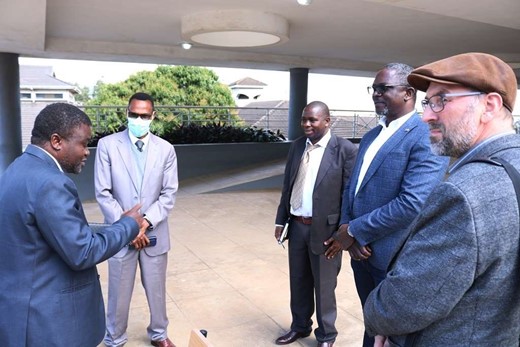By Monica Tambala

Lilongwe, August 4, Mana: Kamuzu University of Health Sciences (KUHeS) in partnership with Rephaiah, a research-focused pharmaceutical company from Iceland, has risen to cooperate in establishing a state-of-the-art pharmaceutical manufacturing facility in Malawi.
Recently, the two institutions held their first meeting at KUHeS in Blantyre to identify areas of cooperation to mitigate the scarcity of medical supplies experienced in the country.
“As a country, we cannot only rely on medicines and medical supplies from abroad. The manufacturing countries reserve the vital supplies for their citizens.
“It is a matter of national security to ensure that we are self-sufficient in the supply of medicines and medical supplies. The answer happens to be both local and international,” reads part of the statement of proceedings from the meeting.
The Dean of School of Life Sciences and Allied Health Professionals at KUHeS, Associate Professor Arox Kamng’ona said the university takes research and medicine manufacturing as top agenda.
“As a leading institution that houses advanced medicine research experts in this country, we have placed research and manufacturing of medicine at the top of our deliverables.
“We were urged by the Minister of Health and by the President of Malawi to rise to the challenge,” he said.
The two institutions plan to start small scale manufacturing at the current KUHeS site in Blantyre as they wait for the construction of the much bigger facility near Chileka Airport.
On his part, founder of Rephaiah, Professor Sveinbjorn Gizurarson, commended the partnership with KUHeS, saying they share common values.
“Rephaiah couldn’t find a more perfect partner than KUHeS, an institution already in the business of providing the best care for patients.
“Together, we have the expertise to set our goal on Malawians manufacturing medicines for both national and international markets,” said Professor Gizurarson.
According to the professor, there is already a strong demand for certain drugs in the whole of Sub-Saharan Africa, and that there was no need to wait any longer for manufacturing to start.
Similarly, Hellen Chabunya, one of the Malawian Directors of Rephaiah which has been established as a not-for-profit pharmaceutical manufacturing entity, also expressed her commitment in the endeavour.
“Our commitment is to propel Malawi as a centre of excellence and preferred supplier for medicines in Africa. Our plan is that Rephaiah will be fully owned and operated by indigenous Malawians once we have full leverage on the global expertise we have with our partners.
“We will do this when we have trained the necessary people for the sustainable continuity of this business in keeping with our mission and service to Malawi,”she said.
Construction of the medicine manufacturing facility is projected to start in 2023.

